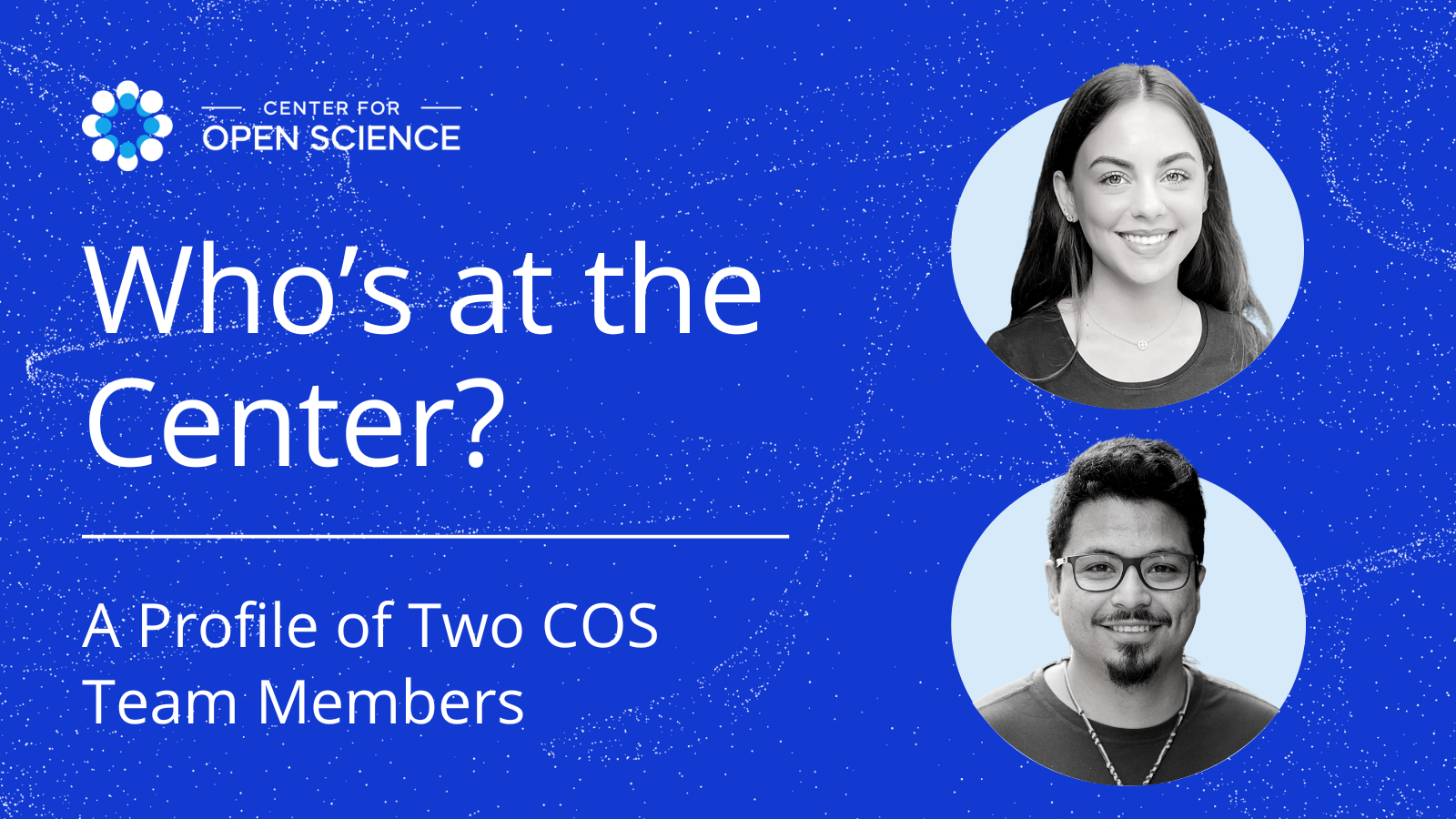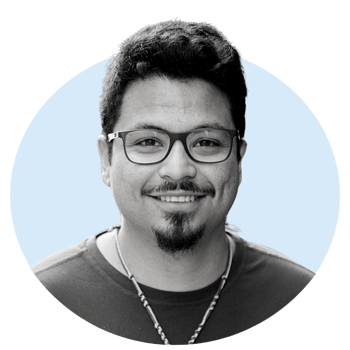
Every weekday at the Center for Open Science (COS), 47 talented individuals work hard in different ways to help improve the tools, methods, processes, and incentives involved in scientific research. Some COS team members are researchers themselves, with backgrounds in psychology, microbiology, ecology, political science, economics, and education. Others of us are software developers who maintain and develop the Open Science Framework (OSF), including software, DevOps, and QA engineers. Still others are professionals with specialties in marketing, human resources, fundraising, product management, and operations.
The diversity in our backgrounds and skills makes us a strong team, but what we all have in common is that each of us is committed to making science work better for everyone, from researchers themselves to those who benefit from the discoveries and innovations that science offers to society.
We wanted to spotlight two of our staff members who play very different yet very important roles in our mission: Macie Daley and Josh Hernandez. Please consider a gift to COS during our 2023 Year-End Fundraiser to support Macie, Josh, and the rest of our team!
 Macie Daley
Macie DaleyHow long have you been with COS?
One year
What is your Favorite book, movie, or TV show from childhood?
The Amazing World of Gumball
What does your day-to-day role at COS look like? What are some tasks or responsibilities that are unique to your role?
I help keep our research projects on track. This includes long-term planning like creating timelines and broad task lists, to the actual daily execution of our studies. A responsibility that’s unique to my role is helping work our often novel and experimental research designs into practical, viable workflows.
How would you describe your role as contributing to our mission of transforming scientific research?
As a member of the research department, I contribute to the knowledge-generating aspect of transforming scientific research. Part of our theory of change includes understanding how research is currently conducted, as well as testing the effects of tools that could be innovative to research - both of which are the motivations for the research projects I work on.
What does "open science" mean to you personally?
Open science means conducting and disseminating scientific research with humility, integrity, and transparency. To me, this looks like providing open access to all research materials where possible, documenting the development of your analysis plans well, and being forthright about your errors. On the flip side, it also means the end of impact factor or number of publications/citations as gold-standard metrics for academic journals or researchers.
What COS-related project, milestone, or event are you most looking forward to in 2024?
I am looking forward to the wave 1 data release of the Global Flourishing Study. Aside from the impressive structure of the project itself, our research department is conducting a study alongside GFS, and it will really start to pick up once the first wave of data comes out. As one of the main projects I’ve worked on since coming to COS, I am really looking forward to seeing the planning and designing we’ve done regarding that project come to life.
 Joshua Hernandez
Joshua HernandezHow long have you been working at COS?
4.5 years
What’s your favorite holiday dessert?
Mexican buñuelos
What does your day-to-day role at COS look like? What are some tasks or responsibilities that are unique to your role?
Normally, I test new features of the OSF before they release to ensure that the software works smoothly and is free of bugs or glitches. We use a variety of testing techniques to make sure our software is providing a good user experience. At times, I feel like a digital detective searching for bugs. It’s rewarding to find unexpected ways to interact with our platform.
How would you describe your role as contributing to our mission of transforming scientific research?
My job is to ensure the scientific community receives a high quality software product. I consider myself a “super user” of the OSF and I always try to put myself in the shoes of a scientific researcher. While testing, I have access to all the workflows we offer and I’m always looking out for parts that may be confusing or unintuitive.
What does "open science" mean to you personally?
One thing I was surprised to learn when I joined COS is that negative results aren’t always shared with the scientific community. I believe sharing all outcomes of scientific research can help save time and money. “Open science” means lowering the barrier for sharing scientific research and making data more accessible. At the same time, it means opening doors for collaboration and reproducibility in what can be a competitive environment.
Do you have a favorite project or program you've worked on while at COS?
My favorite ongoing project has been the Selenium WebDriver test suite. Using Python scripting, we’ve created a set of tests for the OSF that behave like a virtual robot. Selenium tests can mimic what a person does on a computer—clicking buttons, filling out forms, and navigating through web pages. This saves us time during testing and helps us detect unexpected changes for our constantly evolving platform.
Look for more staff and community collaborator profiles from us in 2024. We are grateful for all of the talented professionals who work with us and for us to advance open science!
Do you have a unique perspective on open science you’d like to share, especially one that includes COS or OSF? Contact giving@cos.io to let us know. We’d love to hear from you!

210 Ridge McIntire Road
Suite 500
Charlottesville, VA 22903-5083
Email: contact@cos.io

Unless otherwise noted, this site is licensed under a Creative Commons Attribution 4.0 International (CC BY 4.0) License.
Responsible stewards of your support
COS has earned top recognition from Charity Navigator and Candid (formerly GuideStar) for our financial transparency and accountability to our mission. COS and the OSF were also awarded SOC2 accreditation in 2023 after an independent assessment of our security and procedures by the American Institute of CPAs (AICPA).
We invite all of our sponsors, partners, and members of the community to learn more about how our organization operates, our impact, our financial performance, and our nonprofit status.